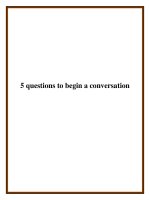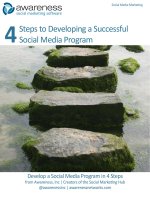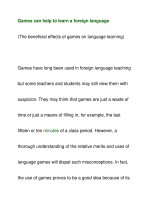Ebook+5+Steps+to+Speak+a+New+Language
Bạn đang xem bản rút gọn của tài liệu. Xem và tải ngay bản đầy đủ của tài liệu tại đây (3.91 MB, 124 trang )
5 steps to speak a
new language
__________
(Hung Q. Pham)
2
5 STEPS TO SPEAK A NEW LANGUAGE
Copyright © 2010 by Hung Quang Pham
All rights reserved. No part of this book may be reproduced or
transmitted in any form or by any means without written
permission from the author.
Published in the United States by Cooper Cameron Publishing
Group, Oregon.
ISBN 978-0-578-06697-4
Printed in the United States of America
August 2010
3
Dedication
To Thu Nguyen, my wife and best friend.
To my parents, they are my true heroes.
4
This page intentionally left blank
5
Contents
Chapter 1 Things You Should Know Before Starting 7
Chapter 2 Pareto Principle and Core Vocabulary 16
Chapter 3 Build a Natural Language Acquiring
Mechanism 24
Chapter 4 1
st
input – The Free Reading Technique 35
Chapter 5 2
nd
Input – The Sound-Mapping Technique 56
Chapter 6 Writing – a Great Tool 69
Chapter 7 Develop Your Speaking Skills 76
Chapter 8 Polish Your Pronunciation 94
Chapter 9 Viewing grammar from another aspect 105
Chapter 10 Other Techniques For You To Accelerate 108
6
This page intentionally left blank
7
CHAPTER ONE
Things you should
know before starting
“If you want to shine tomorrow, you need to sparkle today.”
- HUNG Q. PHAM
peaking a new language is something a lot of people have
always dreamed of. They want it for various reasons. For
those who are living in my country Vietnam, being able to
speak English well could dramatically change their career
prospects. For kids born in the US but having parents who
cannot speak English well, learning their mother tongue could
bring the family closer. Some people learn a new language for
their beloved, like my friend, Brian, who has fallen in love with
S
8
a Vietnamese girl. Well, I am not here to talk about why we
need to learn a new language, but how to do it. So why don’t we
just jump right into it?
Every player has a warm-up session before entering a game. We
are going to do the same. In the next section, we are going to
talk about some common myths about learning a new language.
You will see that although learning a foreign language is not an
easy task, you absolutely can master it if you know how.
The Myths
I am not born to learn a foreign language.
Most people believe that to learn a new language requires talent
of some kind. What we have usually heard from our parents is:
“My son has a great talent in foreign language” or the reverse
“My son is no good in foreign languages”. I hope you are lucky
enough to hear the first comment as it could give you huge
confidence and boost your learning efforts. If you got the latter
one, you might believe it and give up after your very first
attempt.
A foreign language is also called a second language. Let me ask
you a question: haven’t you been successful with your first
language? And if you were able to learn the first one, why can’t
you learn a second one?
When you first learned your mother language, you lacked many
tools. At two or three years of age, you had no dictionary, no
reading/writing skills, nor experience. Yet, you could master it.
Now that you’ve got a lot of tools around to assist you, why
can’t you just repeat that success?
The bottom line is that your belief matters.
I am too old to learn a new language
9
This is one of the most common complaints I have been
hearing from my students and friends. Many people, including
scientists, believe that kids are better at learning a foreign
language than adults. They also believe adults cannot absorb a
new language anymore.
It is true that kids seem to adapt more quickly with a new
language environment. Many reports support that idea.
However, you can also see that kids quickly get familiar with a
new language but, after a short period of time, they tend to slow
down to a normal learning rate. I first learned French when I
was only 11 years old and English when I was in my high
school. English had been one of my majors for many years
afterward until I left university. It was still important when I
started working. Several years after that, I still could not speak
English well. However, when I got older (of course, everyone
grows older than when he or she was in school), I achieved
much more success in only a few months than what I’d
achieved in all the years before that.
Steve Kaufmann is an American linguist; he can speak nine
languages (by now, he may have learned a few more). And he
started learning his ninth language when he was 59 years old.
It is not about how old you are; it is about how old you think
you are.
I must go to the country where people speak the
language I want to learn.
I agree that being in the country where people speak natively
the language you want to learn would help you a lot. But it is
not a must.
I have been in the US for six months to learn English. I found
that a lot of the “environment factors” I got there does exist in
Vietnam, my home country. I still remember my very first days
in the US; a Vietnamese-American friend of mine told me:
“You better watch television every day to improve your English
10
listening skills”. That was an honest recommendation. But it
shocked me because I came to the US hoping that this country
could help me skyrocket my English skills, not to watch TV.
If you are at home and want to improve your listening skills,
why not just watch TV?
In Chapter 10, I will tell you many other tactics to get a “native
speaking environment” right in your country.
Learning a new language is a long journey. It might
take your whole life to learn one.
If it takes your whole life to learn a new language, how many
lives do you think Steve Kaufmann or others who can speak
four or five languages had? In fact, many people, including me,
have been learning a new language for quite a long time but
never focused on it. It is as if you want to build your muscles by
lifting the 5kg-weights only three times a day. Results never
come that way. When it comes to learning a foreign language,
being focused is the key. If you focus in the right manner, you
can achieve mastery in a short period of time.
I must have a good teacher
Some people tend to delay things; I call them “delayers”. They
keep looking for good teachers even though they have no idea
what a good teacher looks like. I think every teacher has his or
her own strengths and weaknesses. The important thing is what
you can learn from them, not what you cannot learn from them.
Even a native speaker will have weaknesses in teaching their
own language. For example, sometimes, a native speaker cannot
understand clearly why a word is so easy for her to pronounce
but not for her students.
You don’t need a very good teacher, but you DO need a good
process.
11
Only smart people can learn new languages
It is true that when you meet someone who can speak one or
more foreign languages, you feel that the person is smart.
However, many studies show that it is learning a new language
that boosts your IQ, which means learning a foreign language
makes you smarter, not that you must be smart to learn a new
language. This finding is quite interesting, isn’t it? If you are still
concerned about how smart you are, the following findings
might excite you.
Research shows that our brain contains around 30 billion cells.
Every time we absorb or analyze information, new connections
are formed among these brain cells. These connections could
disappear quickly or be retained for a long period of time
depending upon how important the information is to you. It is
not the number of cells that determine the level of your
intelligence; it is the number connections that does. The
number of connections increases as your brain works and
decreases when you stop thinking or remembering things. If
you do math to count the connections possible, it is
unimaginable; it is almost unlimited!
Tony Buzan, a well-known human brain expert, estimated that
an ordinary person uses only around 3% to 8% of his or her
brain capability. A person who is considered unintelligent could
be using 2% of his or her capability. While those smart persons
could be using only 10% their brain potential. It means no
matter how much your IQ is at the moment, you are
somewhere between 2% to 10%. If you are in a marathon,
standing a few meters ahead of or behind the starting line does
not make much of a difference, but your continuous effort
does. There is much room for improvement. If this is true, your
next question is going to be how to be more intelligent?
I used to think that our brain is like a computer hard disk, that
if we squeeze too much information into it, some old
information will be replaced by the new information coming in
and be lost. I found that I was wrong. The truth is that if you
12
get more information, your ability to memorize increases
accordingly. You then can memorize more and at a faster rate.
On the contrary, if you think less, your ability to think will be
undermined. Our brain has a mechanism similar to our muscles.
If you regularly work out, your muscles will become stronger,
and conversely, if you don’t exercise, your muscles will grow
weaker. Research reveals an interesting finding that whenever
we face a problem and we try to find a solution, new
connections are formed within our brain making us a little
smarter. If we choose to stop thinking, we grow a little less
intelligent.
I have a neighbor who is a taxi driver. He once told me that he
did not like his job. When I asked him why not change to
another job, he insisted that he was a dumper and that he could
not manage to learn anything new. One day, when we were
enjoying a drink together at his home, waiting in front of the
TV for the World Cup football match to start, he challenged me
to play chess. Just so that you know, I am not a very bad chess
player. I used to defeat my father and his friends when I was
only 11 years old. Yet, I lost three matches continuously in just
15 minutes! When I was writing this section, my neighbor’s
image suddenly popped up in my mind, and I asked myself:
how could a good chess player be a dumper!
If sometimes you think you are not intelligent, think again!
Yes, you can learn a new language
I heard an interesting story when I took a course with Brian
Tracy, a go-to person if you are seeking success. It was about
Africa where there are a lot of elephants and mahouts. One day
a group of visitors came to see mahouts train their elephants.
They were surprised to see the mahouts use quite thin ropes to
tie the elephants’ legs onto a pole. It looked like the elephants
could break off the rope at any time. When the visitors brought
their question to a mahout working nearby, he explained: “An
13
elephant is tied by this small robe when she is just born. In the
beginning, she tries aggressively to escape. But all of her efforts
only result in painful marks on her leg; she is still too young to
break the rope. After a few days of attempting to break free, she
finally gives up. Even when she has grown into an adult and is
much larger in size, she never gives it another try again”.
Any of us could have suffered a failure of some kind when we
were young. A bad grade at school is just one example. These
failures have an impact on our beliefs about our ability. They
drive us to think that we cannot do certain things. Psychologists
call it “self-limiting beliefs”. As the name suggests, whatever
you think you cannot do, you cannot do it. However, it is not a
truth; it is just a belief. The only thing you need to do is to
change it. Yes, I mean change your belief!
So, is it difficult to learn a new language? I cannot answer it but
I am sure that learning a new language is a skill, not an art. An
art, such as painting, might require talent at some level, a skill
does not. Everyone can learn a skill. For example, if you’ve
never done push-ups, chances are that you would not be able to
do it more than ten. But if you practice regularly, within one
month, you could manage to make it 50 – 70; some people can
even make it a 100! However, imagine if I do not tell you this
and if suddenly you see someone do 100 times push ups, you
would think he must be special, wouldn’t you? Many people who
have heard me speak English with an American accent have
assumed that I must have been in the US for years. When I tell
them I have studied there for six months, they think that I am
quite special. They do not know that, not long ago, I had been
very normal.
Many people do not achieve success in learning a new language
due to one reason: they do not know the secret circle of any
project. The secret circle can be described in the following
figure:
14
As you can observe, most people assume there would be no
failure or obstacle on their journey. When they do face one (in
Step 2), they get frustrated, their initial enthusiasm and high
energy quickly go down. Some people do go to Step 3 where
they make some adjustment and try again, but they quit after
facing another obstacle. Some others do go to Step 4 where
they achieve success of some kind. But then, they simply get
satisfied with what they have achieved and stop putting more
effort. Only those who go to the final step will achieve their
target.
This circle applies not just to studying language but to almost
any field. If you get through all the steps, you can definitely
learn any language. And you can learn it fast with the tools and
techniques I am going to share with you in this book.
You need a big enough reason
Sometimes, people are not very clear about why they need to
learn the language they are aiming to. Maybe, you learn it
15
because your friends or your parents tell you to do so. Maybe,
you just want to put one more language on your CV believing
that it will make some difference. Many expatriates work in
another country and think that they should learn the local
language. Whatever reason you have, a foreign language is
something you cannot learn if you do not want it badly enough.
What I recommend you to do right now is to leave your book,
have a cup of coffee somewhere and ask yourself: why do I
need to learn this language? Think a bit further about what you
want to get in the future. Think about your dreams, wishes and
your plan. Where does the language stand in your plan? What
does the language have to do with your dreams? Do you really
need that language, and what benefits will you have if you
master it? Your brain is awesome, but it needs a good enough
reason in order to perform a difficult task. If you want to
quickly master the language you want to learn, start with a
dream. The moment you decide language is not something that
can stop you from making your dream come true, you have
almost done half of the journey.
16
CHAPTER TWO
Pareto Principle and
Core Vocabulary
“Learning without thought is labor lost; thought without learning is
perilous.”
- CONFUCIUS
f you have made the decision (and I hope you have),
congratulations! I have never seen anyone who has decided
to learn a language fail. In this chapter, we are about to
discover one of the most important factors that decides
whether or not you can learn a new language in a short period
of time.
I
17
When it comes to language, most people will agree with me that
vocabulary is at the top of the priority list. Without vocabulary,
you definitely cannot hear, speak, or write. You are still able to
communicate without proper grammar or with poor
pronunciation. But you can do nothing without words.
Language is formed by words and the way words are put
together logically.
Nevertheless, have you ever asked: “How many words do I
need in order to speak well?” Not everybody asks that question.
Most people just start right away without realizing how far they
will have to go and how long it will take to get to the end of the
road. That is not very good when you have a long journey. You
will be more likely to reach the target if you have a map in your
hand, or know the way you have to go.
There are approximately 600,000 different words in English.
This figure varies among languages from 400,000 to 1,000,000
or even more. Let’s take a look at a dictionary. You will find
that an average one will have 300,000 – 400,000 different
words.
You could have been learning a foreign language for sometime
now. I do not know how many words you’ve got, but I am very
sure that the number of words you have studied is much larger
than the number of words you’ve retained. It may seem that
there is a “hole” in your mind through which new words keep
leaking out. Even though you have been trying to pick up new
words every day, what you retain doesn’t seem to make the
effort worthwhile. With 600,000 – 800,000 different words,
even if we assume that you keep learning new words everyday
and retain about 20 words per day (this is not a bad result at
all!), it results in 7,300 words a year (365 x 20). You do the
math!
Fortunately, life does not have to be that hard! Things in our
world are arranged by an interesting principle called the 80/20
principle. This was found by an Italian economist named
Vilfredo Pareto. That is why it is also called the Pareto principle.
18
Pareto observed that 80% of the lands are owned by 20% of the
population. He found that this number is true in many other
fields, as well. For example:
•
20% of the input creates 80% of the result
•
20% of the workers produce 80% of the result
•
20% of the customers create 80% of the revenue
•
20% of the bugs cause 80% of the crashes
•
20% of the features cause 80% of the usage
•
And on and on…
In fact, the rate of 80/20 is rather a symbol than an exact
number. In many cases, it could be 90/10 or 95/5.
This principle became well-known because thanks to it people
could decide what to put their efforts (time, money,
resources…) into in order to get the most results. Simply put,
19
work less and gain more. Don’t you want to spend less time but
get more results in learning a new language?
The great thing is that the Pareto principle is also true in
learning a new language. Even though the total number of
different words in English comes up to 600,000, only a small
portion of that number is used in American daily lives.
Shakespeare is known to be an author who used a wide variety
of words and phrases in his works. If you ever read him, you
will find many words that you would never use or even think of
in your life. Yet, statistics shows that he has used only a total of
approximately 20,000 different words in all of his works put
together.
How about that number in our daily lives? As early as the 1930s,
George Zipf (1935) had made influential proposals about the
statistical distributional properties of the lexicon, widely known
as Zipf’s Law. He researched various languages, including
English. He found that each word has a different frequency of
occurrence. In English, the word “THE” tops the frequency
ranking with 7.5%, “OF” following with 3.5%, and so on.
Amazingly, just 130 words make up 50% of occurrences.
20
Other studies show that Americans use around 2500 – 3000
most common words in their daily lives. The good news is that
these 3000 common words build up more than 95% of the
content in any conversation, telephone call, e-mail or even
books and newspapers.
In other words, instead of learning 600,000 different words, you
can focus on 3000 most common words but still understand
95% of all conversations, e-mails, newspapers and books. If you
take 3,000 and divided it by 600,000, the result is 0.5%. These
most common words belong to what we call the core
vocabulary. Some linguists believe that the core vocabulary
should contain 4,000 instead of 3,000 words. Others think it
should be 2,000. But I think the exact number is not very
important, because the bottom line here is that you will be able
to master communication in your new language by focusing on
this core vocabulary.
Some of my students feel rather uncomfortable with this
recommendation, as they want to fully understand (100%) all of
the content they are exposed to. They do not want to lose the
remaining 5% content by understanding only 95%. Yes! I totally
agree with them. I am not saying that you should understand
only 95% of the language you’re learning. I am talking about
where to focus first. After mastering the core vocabulary and
understanding most of the language, no one can stop you from
discovering further to enrich your vocabulary. However, if you
seek perfection in the very beginning, you will be scattering
your time and effort in a wide area. Unfocused effort will lead
to no results for too long and make you tired. Long ago in
China, Sun Tzu, a well-known strategist, talked about a
technique for the minority to defeat the majority. The technique
was to focus all the effort on the weakest point of your enemy.
You should use the same strategy for learning a new language.
Another reason for you to focus on the core vocabulary is that
in order to remember and be able to use a specific word you
will have to be exposed to that word several times. Many
linguists believe that a person will need to get exposed to a
21
word 5 to 10 times to master it. That is why it is not a good idea
at all to spread your efforts thin.
Basically, almost every language in the world follows the same
pattern in that a small percentage of the total number of words
make up the core vocabulary of any particular language.
However, different languages may have different total number
of words leading to varying sizes of their core vocabulary.
Below is an illustration of the word frequency distribution and
core vocabulary in Russian (source: www.how-to-learn-any-
language.com).
The result is that:
the 75 most common words make up 40% of occurrences
the 200 most common words make up 50% of occurrences
the 524 most common words make up 60% of occurrences
the 1257 most common words make up 70% of occurrences
the 2925 most common words make up 80% of occurrences
the 7444 most common words make up 90% of occurrences
the 13374 most common words make up 95% of occurrences
the 25508 most common words make up 99% of occurrences
22
Okay, so you have got the first secret in my second language
learning process. However, I have only mentioned the size of
the core vocabulary. We do not know yet what words go in
there. Well, if you run a search on the Internet or look at some
language learning book, you would probably find lists of words
that form the core vocabulary for your target language. On
www.wiktionary.org
people even have frequency lists for
various languages. A friend of mine collected a list of 1500 most
common words in English as he was trying to improve his
English skills. If this is the first time you are seeing such a list,
chances are that you might be tempted to learn by purely
memorizing it. Well, you can try doing so if you want. But I am
sure that it will not work! Memorizing a list of words out of
context is one of the worst methods in learning a new language.
Being able to memorize it does not mean you can use it. And
when native speakers talk to you, you might not understand
even though they speak using those words! A number of second
language learners do know about the existence of core
vocabulary, but they do not know how to exploit it effectively.
They do not know how to approach it properly. The main
reason is that you need to acquire a language, not purely
learn it, and you absolutely cannot memorize a language.
Please don’t worry about the concepts “acquiring” and
“learning” yet, I will explain them later in the next chapter.
Now, please be a bit patient, as I seem to be rambling on about
this topic. This idea is so important that I would like you to
fully get my point before introducing you to the next step. In
the next chapter, I will be instructing you how to acquire the
core vocabulary of the language you’re learning and to master it
confidently.
Before moving to the next chapter, I would like to introduce a
concept somewhat similar to core vocabulary – core phrases.
As its name suggests, core phrases are the most common ways
of putting words together. In other words, they are the most
common sentences and phrases. This is the second reason why
you cannot learn a language by just memorizing its core
vocabulary list. The idea is simple: you cannot speak a language
23
if you know the words but don’t know how to put them
together. Core phrases are just as important as core vocabulary.
They will help you master the listening, speaking and writing
skills in a new language more quickly by recognizing and
mastering whole phrases instead of individual words. Let me
give you an example:
In everyday English, you would normally say: “I’ll be right
back”. It means that you are about to go somewhere and will
return shortly. You rarely use any other way to express this idea
when you speak. If a learner of English tries to memorize
individual words and then tries to remember how to put them
together, it will not be as efficient as memorizing the whole
phrase. In fact, it is easier to memorize and recall a long phrase
or sentence than a single word. This fact is especially true when
developing listening skills because you will be more likely to
recognize and understand a long phrase than a single word. It is
just like listening to a song. If I play only a few sounds, you
might not be able to recognize which song it is. But the job will
be much easier if I play a longer piece of melody.
The same thing happens when you speak. If you use common
phrases when you speak, native speakers will be more likely to
understand what you want to say although your pronunciation
may not be really good yet. For example, if I asked an
American: “is your health good?” as an opening remark, he
would not understand. It is simply because Americans do not
say it that way, even though the sentence is correct in terms of
grammar. In other words, the sound in this case is not familiar
to them in this particular context. However, if I say: “how are
you?” or “how are you doing?” people will understand
immediately no matter how bad my pronunciation is.
In short, learn the way native speakers speak; learn the common
phrases and sentences they use. That is the fastest way to
communicate effectively in a new language. I call it “take the
whole bundle” technique. Now, let’s move on to the next
chapter and discover how you can quickly absorb the core
vocabulary!
24
CHAPTER THREE
Build a Natural
Language Acquiring
Mechanism
‘A journey of a thousand miles begins with a small step”
- LAO TZU
25
n the previous chapter, we talked about the 80/20 rule.
Now, you have got some idea about the workload, which is
not as huge as you might have thought. In the following
pages, I am going to answer your question: How do you
learn vocabulary? Where do you find those common words?
How do you approach them?
Here is my answer: We are going to build a mechanism so that
you can acquire the common words in the core vocabulary of
the language you want to learn in a natural way. In other words,
we are going to build a system that can attract the core
vocabulary you are exposed to. It sounds like hype, doesn’t it?
Before going into the details of the system, I would like to
explain a bit more how the human brain learns a language, the
difference between learning and acquiring, and the concepts of
input and output.
How does your brain learn a language?
In his book Second Nature Brain Science and Human Knowledge,
Nobel Prize winning author Gerald Edelman reveals a lot of
interesting findings about the human brain. A particularly
interesting revelation was the mechanism on which brain
functions. When comparing the human brain with the
computer, he found that the two worked on very different
mechanisms. Unlike computers, our brain cells (neuron)
function by a mechanism that he called “pattern recognition”
and “association” and not on logic.
In the beginning, these concepts might confuse you; they
certainly confused me. You can think about “pattern
recognition” and “association” as the way in which the brain
starts to draw a new map as you learn a new language. The input
signals you get via your eyes (reading) and ears (listening)
stimulate the cells in the language processing area of your brain.
As you continuously receive inputs, repetitive signals create
“marks” or “traces” in your cortex. The sets of traces and marks
I









